#because it does talk about death and family estrangement and drama and focuses on that stuff
Explore tagged Tumblr posts
Text
How to write about Grief:
There is no right or wrong way to experience grief. Just as there is no right or wrong way to write it. Everyone is different, each set of circumstances are different.
The point of this post is to show you how different people react in different ways, and give points on how you might write that, depending on your character and story.
Reactions to Grief
Numbness: Your character may go into auto-pilot and be unable to process the events that have unfolded.
Anger: This can be aimed at other people, at a Higher Being, or at nothing in particular.
Unsteady: Your characters may be unsteady. For example, unable to stop their voice from shaking or they may find it difficult to stand.
Focusing on Others: Your character may disregard their own feelings because they are so overwhelmed and instead concentrate on someone else’s well-being.
Seek out routines: Amid upheavals, your character may seek comfort in tasks that are familiar and “safe,” such as working, cleaning, making their bed, making absurd amounts of tea or taking a morning walk.
Pretending that Everything Is Okay: Grief is viewed as an emotion that should cease or be concealed once the funeral is over. So people mention the news in an offhand comment, then talk and laugh as if all is right with the world.
Denial: Some people deny the reality of death and convince themselves that the news is a joke or can’t be true.
Reactions from people surrounding your character:
People may avoid your character as they do not know what to say or simply can’t find the right words.
Some may even go as far as to cross the street when they notice your character approaching.
Even people that the character has known for years may act strange or standoff-ish, simply because they don’t know what to say.
On the other side of that, some people may be overly helpful and friendly.
It is not uncommon for estranged friends, family or others to suddenly reappear in a person’s life after they have experienced grief.
Either because those people want to offer their support and love or because they’re being nosy and they want to be kept up to date on the “drama”.
Most people will move on from the event fairly quickly if they weren’t emotionally invested.
Some people may even get annoyed at your character for still being upset weeks or months later.
When talking about the person they have lost:
Your character may recall a memory or tell a story about their loved one, these are possible reactions. (I have encountered all of them.)
Your character may being to cry or get upset at the thought of the person they have lost.
The person they are talking to may become awkward and avert eye contact when your character brings up the person they have lost.
Others may ask or tell your character to stop talking about the person they have lost. They may roll their eyes, cough awkwardly, or cut off your character mid sentences so that they can change the subject.
Some people may ask inappropriate questions about the circumstances in which the character’s loved one passed away. Depending on the personality of your character then may react differently.
Other things to note:
Grief is not constrained by time.
One of the main problems with grief in fiction is that a character is typically heartbroken for a couple scenes and then happy again. But grief does not evaporate because the world needs saving.
Allow your character to wrestle with their grief.
Your character may feel guilty. Your character may feel a twinge of guilt when they laugh or have a good time with someone else; when they do something to remind them that they’re alive, and their loved one isn’t.
Grief is a game changer. A previously outgoing character may withdraw and isolate themselves. Some people may take grief and/or bereavement as a sign that life is too short; they may make big decisions in an attempt to make themselves feel better and grow away from their pain.
Sometimes grief can help you find your purpose.
At first grief can be all consuming. It hurts and you can’t really control it. It may seem unrelenting. Eventually the grief will become easier to deal with, your character may find the days to be better, but that doesn’t mean that when the grief hits it doesn’t hurt any less.
For most people, grief never really goes away. “Sometimes you have to accept the fact that certain things will never go back to how they used to be.”
It is rare that a person will ever give a long speech about their feelings, a lot of people struggle to even find the words. But that’s okay. Show the reader how your character feels, rather than just telling them.
Don’t pause the plot to deal with the aspect of grief. This could overwhelm the readers and drag the pace down. In reality, life doesn’t just stop due to grief, the world keeps spinning and things still need to be done. Use the character’s grief as a backdrop for the story’s events.
Yes, grief affects the character’s day-to-day life, goals, and relationships. But it shouldn’t drive readers away or stagnate the story. Instead, should engage readers and produce empathy that keeps them turning pages.
You don’t need to tell your readers that everything will be fine. You don’t need to provide all of the answers.
“Skirting grief and treating it lightly is easy. But by realistically portraying it through a variety of responses and its lasting effects on the character’s life, readers will form a connection with your characters.“
#writing#creative writing#grief#writing tips#nanowrimo 2019#preptober#writing grief#writing references#writing resources#disclaimer a lot of this is from personal experience#nano#nanowrimo#oc#original characters#character development#plot development#world building#tw#trigger:grief#my post
26K notes
·
View notes
Note
Hey, so I've basically never watched any k-dramas, but I've read a lot of manga and manhwa and the automatic next step does feel like moving into k-dramas. You seem to have watched a number, so I was wondering if you could make a recommended list? Only if you felt like it of course, but it would be helpful! (Preferably of at least some which are on netflix uk, I looked up 18 again but it's unfortunately not on here in Britain :(. But if you have favourites I'd just like to know them so I can look out for them anywhere)
Also yay! Your term's ended!
(yanks open the door) did someone say RECOMMENDATIONS?? I DO have many!!! Boy do I have them!!!!
(YAY!! One last exam and I'm done for the summer!)
I love Eastern entertainment (manga, k-dramas, c-dramas, and movies from Korea and Taiwan) because of several reasons: the scripts are phenomenal nine times out of ten; Asian culture puts a strong emphasis on the importance of family, personal responsibility, learning from one's mistakes, expressing affection through gestures and acts of service, and friendship and I really love seeing that in a story; and they make good use of silence and stillness in shows and movies, which is pretty rare in Hollywood. The quiet moments between characters are more often than not some of the most important in the story and I Love That!!
The dramas I'm (briefly) listing are in bold if they're available on Netflix UK, and in bold and italicised if they're available on Rakuten Viki (which is a mostly-free drama streaming service, though unfortunately they're rather heavy on the ads). The Absolute Favourites are marked with stars (***). Though I can't actually see the whole list of dramas available in the UK, so some of these may be wrong, and it may be worth checking twice!
If you're in the mood for something fast-paced:
Descendants of the Sun (Viki); considered a Classic
- romantic comedy, medical drama, a bit of action
- The confident and charming leader of a Special Forces unit meets a reserved surgeon and they hit it off, after some... interesting misunderstandings. But after dating briefly and breaking up, they find themselves reunited on a peacekeeping mission in a war-torn country. Insert a lot of Suspense and Excitement but also a lot of Comedy and Sincere Declarations of Love.
- if you enjoy Song Joongki's performance, I'd also recommend his movie A Werewolf Boy. If you enjoy Song Hye-kyo's performance, I'd recommend her drama Encounter.
***Come and Hug Me (Viki, but I don't know if it costs money?)
- thriller/suspense, romance, this one genuinely stressed me out but the moments of peace and reconciliation (and the ENDING) were well worth it
- Their first loves during their youth ends in her mother's death and their separation. Years later, the lively daughter of the murdered woman is now an actress, and the introverted son of the serial killer has become a police officer. They meet each other again (Of Course) and have to tackle all sorts of Nonsense (including the serial killer's return, his murderous brother's return from prison, the Media, the ghosts of their past, etc. etc.) together. HUGE focus on forgiveness, hope, healing, unconditional and self-sacrificial love. Also one of the best redemption arcs (I did in fact bawl my eyes out)
- my friend just started crying when we first watched this drama together because the male lead is just so gentle and tenderhearted and steadfast :')
If you're in the mood for something a bit slower
***Goblin/Guardian (Viki); International Acclaim
- fantasy, drama, one of the funniest dramas I've ever watched, but also tears (I cried at a rate of around once every two episodes. This show talks a lot about life and meaning and the effect your actions and words have on the people around you.)
- Kim Shin, a general from the Goryeo Dynasty, is cursed to live as an immortal Goblin (a Korean mythical/fairy tale figure) until his destined Bride pulls the sword from his chest, thus breaking the 'spell' and ending his life. He really did not expect his bride to be the vivacious and irrepressible Eun-tak, though, and What's More!! He did not expect that he would start wanting to live again :))) Includes a surprising amount of comedy, a surprising amount of tears, and EXCELLENT screenwriting. (Descendants and Goblin share the same brilliant writer.)
- fun fact: parts of it were shot in Quebec!! One of the characters refers to Canada as "the maple nation" early on in the story and my friend and I just burst into laughter.
***Encounter (Viki, but I'm not sure if it costs money?)
- melodrama, romantic comedy, FAIRY TALE
- a cold and withdrawn woman, recently divorced because of her husband's infidelity, and a warm-hearted and optimistic young man meet on the streets of Cuba by accident, and upon separating without means of contact, find themselves back in Korea as boss and newly hired employee. This sounds like a recipe for disaster: stuffed to the gills with unnecessary workplace drama and gossip, etc. but the story focuses instead on family, vulnerability, transformation, sacrifice, about art, compassion, mending relationships, opening up to people, and about the beauty in bringing and receiving comfort and love.
- also. ALSO. Fairy tale!!! with illustrated opening and ending cards and everything!!! (they literally refer to her as the Ice Princess. And her Prince is the human equivalent of sunshine. I Love him)
- if you like Park Bo-gum's performance, I'd recommend Reply 1988, too!
***One Spring Night
- melodrama; quiet and understated but very beautiful
- A bright, clever, and sharp-tongued librarian meets a quiet, steady, and gentle pharmacist one day. It turns out that he's a single father, and she's trapped in a relationship that really isn't working out. Friendship! Family! Sisters standing up for each other and saying No I Won't Let You Treat My Sister Like This, You Jerk! Figuring things out! Learning how to love! I really don't know what else to say, except for the fact that I loved it very much!!
- if you enjoy Jung Hae-in's performance, I'd also recommend Something in the Rain (which should also be on Netflix!) for his acting alone. I just think he's neat.
Reply 1988
- slice-of-life, comedy
- In the late 1980s, five friends (four boys, one girl) who have grown up with each other since childhood are Going Through It in high school. This drama is all about the little things that happen in life, and about learning to understand your family and your friends. Deok-sun is just trying to survive all of This as the middle child, and as a young girl who is trying to figure this Romance thing out. In the present, adult Deok-sun is just as lively, and is now happily married..... but to whom? :))) A Lot of '80s Asian culture, daily antics, and good old friendship.
- if you like Park Bo-gum's performance, I'd recommend Encounter too :)
18 Again (Viki)
- romantic comedy, fantasy/time travel (sort of)
- Nearly twenty years of marriage, and things have been going Wrong all over the place. His wife wants a divorce, he's no longer close to his teenaged kids, and he's just lost the job he's been faithfully working at for years. Daeyoung wishes that he could go back somehow, and finds himself 18 once again.... except he's still in the present. Interesting things ensue. He enrolls in school (it turns out to be the same one his kids attend), and decides to pursue the dreams he had to give up when he was a teenager. Antics ensue! But also Healing: he gets to know his kids all over again, and is able to view his relationships with Dajung (whom he still loves. Of course) and his estranged father in a new light.
- I have not finished this drama yet but judging from the first third of it, it is both well-written and well-acted. There are a few things that I am not a fan of, but on the whole Lee Dohyun's performance is wonderful and I have already cried buckets.
Other honourable mentions:
100 Days My Prince: historical drama. Prince caught in an assassination plot, loses his memory, wakes up in a village right when the king issues a marriage law that results in his marrying the spirited 'spinster'.
Still 17/Thirty But Seventeen: 17 year old violin prodigy in a coma after an accident, wakes up when she's 30; the boy who inadvertently caused the accident runs into her again after she wakes up and helps her adjust to her new life. Lots of wacky humour, very sweet!!
#as per usual this is horrendously long#but i hope that this is helpful!!#k-dramas in the past have had some pretty questionable male leads#as in: the aggressively alpha male lead who thinks kindergarten bullying is a form of flirting#and i am very Not Here for that#so my favourite dramas tend to have Oak/Tilney/Wentworth-style male leads#ALSO!! storytelling in Eastern media takes a different approach than Western media#so it is so interesting to me to watch dramas like Goblin and 18 Again that take a pretty unconventional approach#songbird again
19 notes
·
View notes
Text
what we could have been
this is a post about the similarities between these old farts
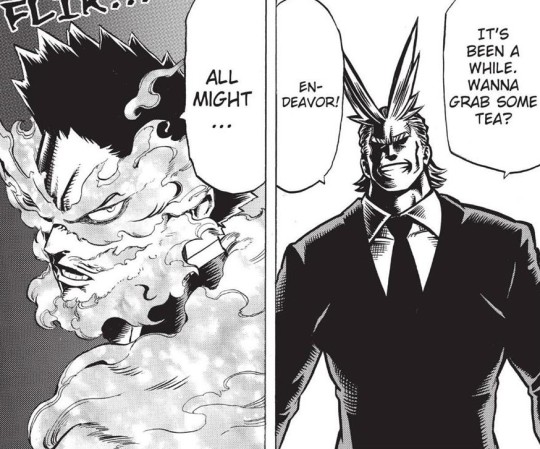
and these lil bubbas
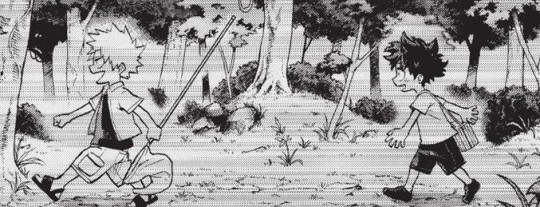
but more importantly, it’s a post about the differences.
so! the manga has recently entered the Internships 2 arc, also known as the Child Soldiers/Todoroki Drama 2.5 arc! so far it is very exciting, and I can’t wait to see how Deku and co. will somehow level up by a factor of 11 just in time to defeat Tomura and his new new upgrade. I assume that this will happen though, since the alternative is... [checks] everyone dies a horrible death. well shit.
anyway, we’ve already had like 12 arcs of All Might being a mentor, but this arc features the first time Endeavor has tried his hand at it! this is of course a universally beloved decision by Horikoshi which everyone in the fandom is very happy about! but I actually do like it, because the Endeavor redemption arc is complicated as fuck and endlessly fascinating to me, and because, truth be told, there is something that even a Certified Son Of A Bitch can still teach these young whippersnappers. even if Endeavor is 99.9% a dick, that 0.01% can still impart something of value. but anyways that’s not what I came here to talk about so let’s move on.
what I want to discuss is the fact that Izuku and Katsuki share very obvious similarities with All Might and Endeavor, and there are very obvious parallels between their respective arcs. Izuku is basically All Might 2.0, whereas Endeavor is presented as a version of what Katsuki could have been. but they are not the same people, either of them, and their paths have started to diverge in ways that are very much for the better. and the reasons for that can all be traced to one simple action, which in turn stemmed from one simple, honest impulse. and I have approximately 10,000 thoughts about it, so here goes.
first let’s briefly touch on those similarities. as far as Izuku and All Might go, their backstories very closely resemble one another. they both started out as quirkless kids who nonetheless held a stubborn idealism and were driven to help others. they’re both incredibly determined and remarkably self-sacrificing. both of them spent the first part of their lives overlooked, undervalued, and underestimated, and they both understand the combination of validation and gut-churning pressure that comes with being chosen as the successor to a great power and a heavy burden. the similarities between them are a large part of why All Might chose Izuku as his successor, despite there being other options on the table. All Might sees himself in Izuku, and that’s part of the reason why they share such a strong bond.
now let’s talk about Endeavor and Katsuki, who share absolutely no bond at all (for now, anyway), but nonetheless hold just as much common ground as their counterparts. they are both fiercely determined and have made it their goal to reach the top. they’re also both foul-tempered with notoriously unfriendly attitudes. and last but not least, they’re both loners who have a tendency to push others away.
one thing that’s interesting is that both Katsuki and Endeavor formerly held strong beliefs about quirks being inextricably tied to strength. Katsuki shunned and scorned Izuku for years because he lacked a quirk. meanwhile Endeavor wrote off 3/4 of his own children because their quirks didn’t develop the way he wanted them to. and it’s only recently that each of them has come to see the error of their ways, which in Endeavor’s case is quite unfortunate, because he’s already well into his forties and has only just now started to con on to the fact that he’s an asshole. whereas Katsuki started this process a whole lot earlier, and as a result is a lot better poised to bounce back from his mistakes and make redemption his bitch.
so segueing now into the “differences” part of this comparative essay, that is Key Difference # 1 for you: Katsuki managed to not waste the next 30 years of his life focusing only on Achieving Strength at the cost of destroying every other positive thing in his life. and while I think there is one reason in particular for this, which I’ll get to shortly, I’ll also go ahead and give Katsuki some of the credit here, because what he did is hard. it’s hard to realize that you have had the wrong way of thinking for your entire life, and to take the steps to get it straightened out. many people are not that open to change. rather than admitting their mistakes, they double down on them and stubbornly defend them. but Katsuki was willing to question everything he’d ever known, and look at it with an open mind, and realize that he was heading down a wrong path. and then he was able to course-correct.
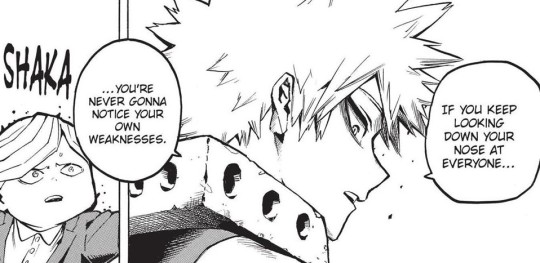
and that takes strength. not the kind of strength he’s so preoccupied with, but an inner strength that he might not have even realized that he has. in this respect he is much stronger than Endeavor, who’s had much more difficulty doing his own course-correcting, although he too is finally starting to figure his shit out (too late to salvage some things, but “better late than never” is a term that still applies here regardless). in my opinion, Katsuki’s willingness to accept his own faults, and to try to change them, is one of the most unexpected and remarkable things about his character, because you wouldn’t necessarily see that coming based on his attitude at the start of the series. anyways, I really like it.
but I did say some of the credit, as opposed to all of it. and the reason for that is because in my opinion, it’s actually Izuku who deserves most of it. but before I explain, let me first backtrack and talk about another aspect of All Might’s character, one he does not share with Izuku.

All Might, like Katsuki and Endeavor, is actually a loner as well. we tend to not notice as much, because he doesn’t really seem to fit the stereotypical profile of a loner-type character; he has a very close bond with Izuku, and he speaks with an earnest and straightforward candor about emotions and subjects that most people wouldn’t be able to discuss with the same sincerity. but it’s true nonetheless. even putting aside this moment in chapter 166 where he outright admits it, there are numerous other little details in the series that show this. he has no family that we know of. only one close friend (and a non-hero at that). at the start of the manga, he was estranged from both his mentor (referring here to Gran, not Nana) and his sidekick. he’s close-lipped about a lot of things, including things he honestly should have been upfront with Izuku about much sooner. and he hides his true self from the world in an effort to preserve that unwaveringly steady image that people have put their trust in.
in the very first chapter of BnHA, All Might makes a speech to Izuku about the reason why he smiles: “to stave off the overwhelming pressure and fear I feel.” All Might was the Symbol of Peace, the pillar that society relied on -- but he was a lone pillar. he kept to himself, and made the choice to bear that weight alone. and this had consequences. I’m speaking not only of the chaos after his fall, but of other, subtler impacts as well.
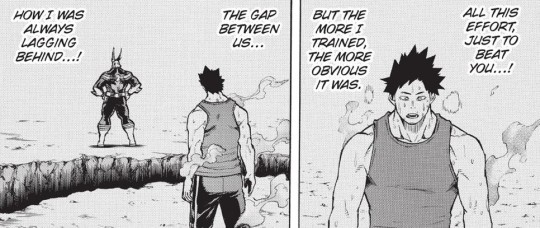
so now, let’s talk about Izuku.
let’s start with Key Difference # 2: Izuku is not a loner. yes, at one point he was alone -- not by choice -- but that isn’t a defining trait of his character. Izuku reaches out. he reaches out to everyone. he makes friends easily. he’s open with his feelings in a way that All Might is not (and which All Might in fact often scolds him for).
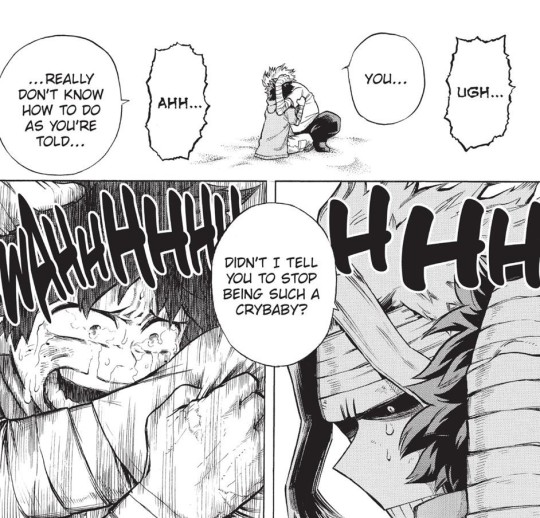
boy just puts it out there. he’s not ashamed. but anyways, it’s actually the part about him reaching out to others that I want to talk about. I’ve said in past essays that Izuku has an instinct to save others which surpasses even All Might’s. when he sees someone in pain, his instinct is to reach out. he will do this every time. regardless of whether it’s asked for, and regardless of how often his attempts may be shunned.
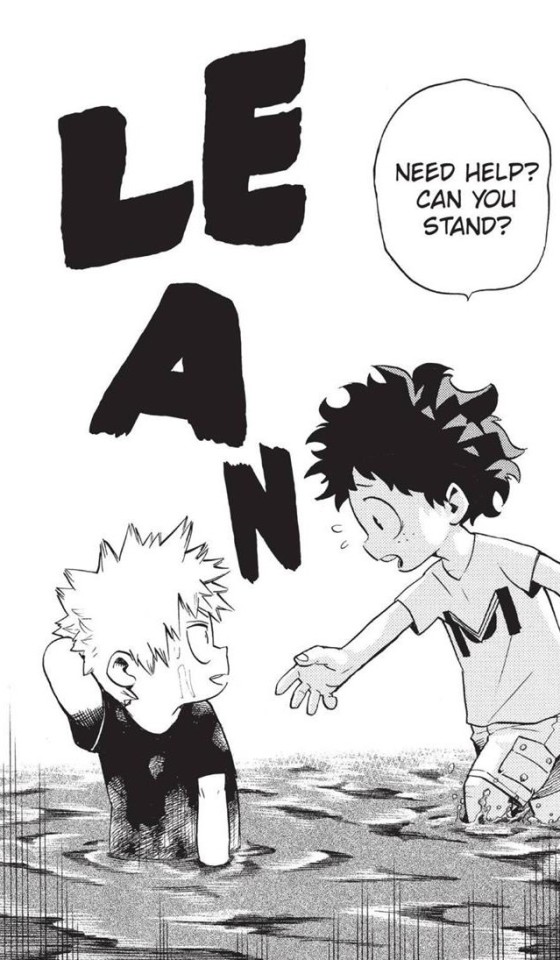
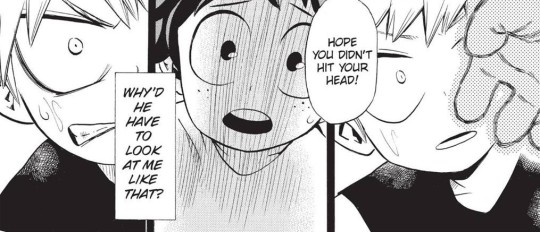
and this, right here, is the most important difference between Izuku (and Katsuki), and All Might (and Endeavor). because you see, All Might, for all his strength and sacrifice, always stood alone.
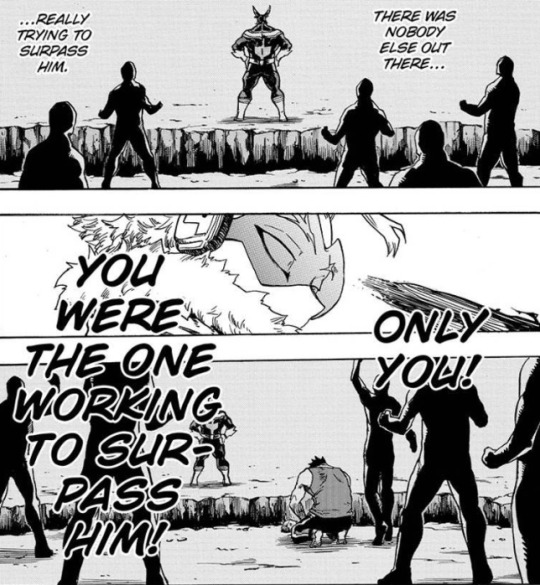
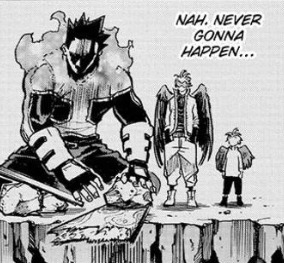
he kept his burden to himself, and never looked back.
but Izuku did.
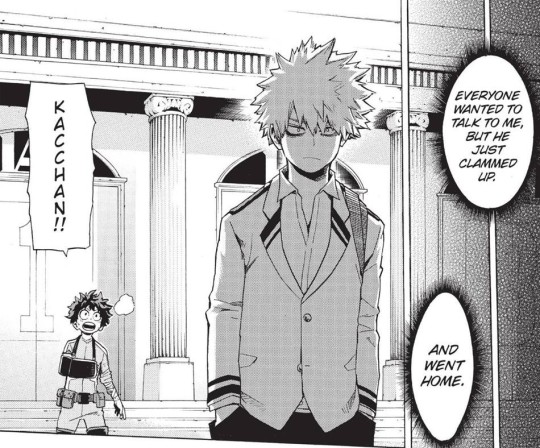
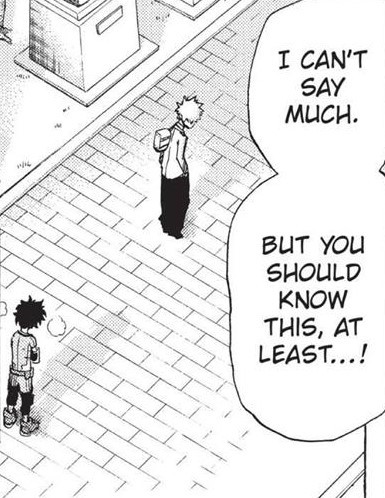
“I got my quirk from someone else.”
this was in spite of All Might, his hero, telling him in no uncertain terms to not share his secret with anyone else. and in spite of the fact that Katsuki hadn’t been anything close to a friend to him for many years. like, it’s actually wild to think about all of the reasons that Izuku had not to do this. but the fact of the matter is this: that where All Might never turned, never wavered, and never attempted to help anyone else cross that gap, when Izuku saw Katsuki in pain, he acted on the same instinct that has guided him his entire life: he reached.
and that...
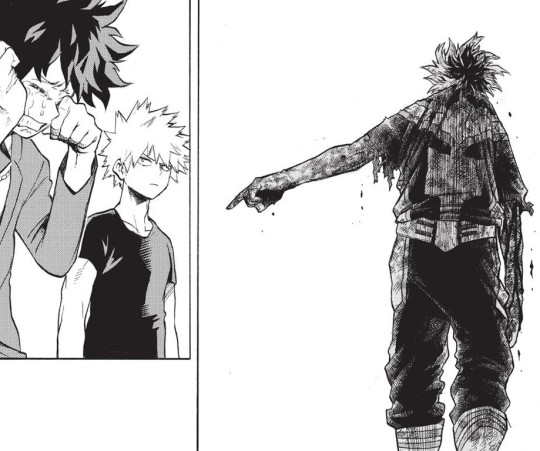
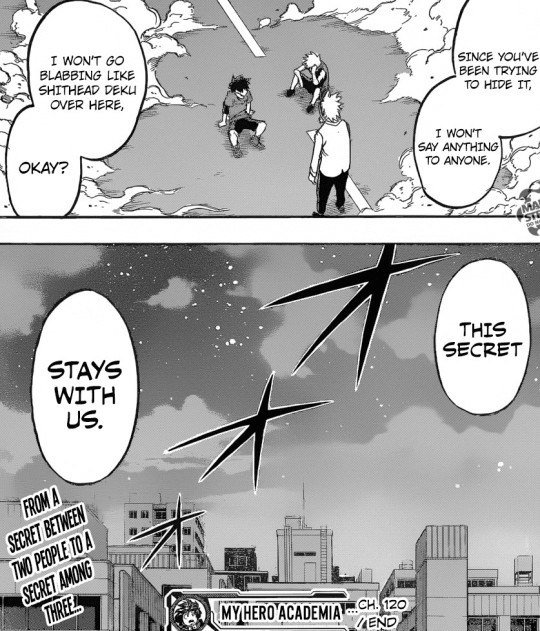

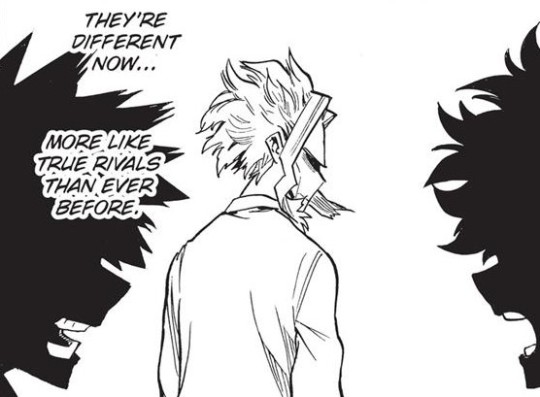
...has made all the difference.
Izuku pulled Katsuki across the gap with him. he let him in. he did this with no expectation of reward, or even gratitude. quite the opposite; Katsuki had always rebuffed his attempts to help before, and even in this case, it initially appeared that he had misjudged again, and that he was just lucky that Katsuki didn’t press the matter. it was a move that defied not just common sense, but all of Izuku’s past experience; nothing about their past relationship ever hinted at a hope for common ground in the future. nothing, that is, except a shared dream.
but he reached out anyway. and because of that, Katsuki was eventually able to put two and two together. and when he did, he did something very unexpected: he reached back.
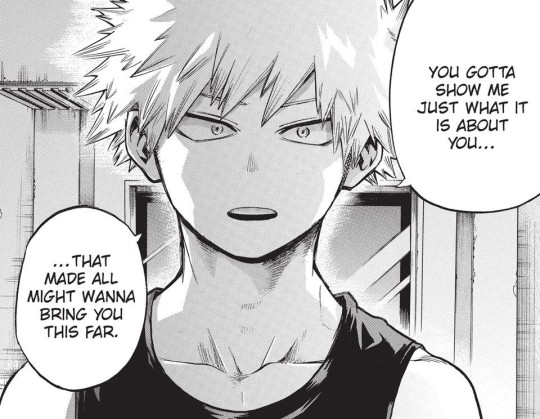
he asked Izuku for help. he did something that Endeavor never managed to do until after All Might had retired and he found himself, at long last, in the number one position, but adrift and without a driver’s manual.
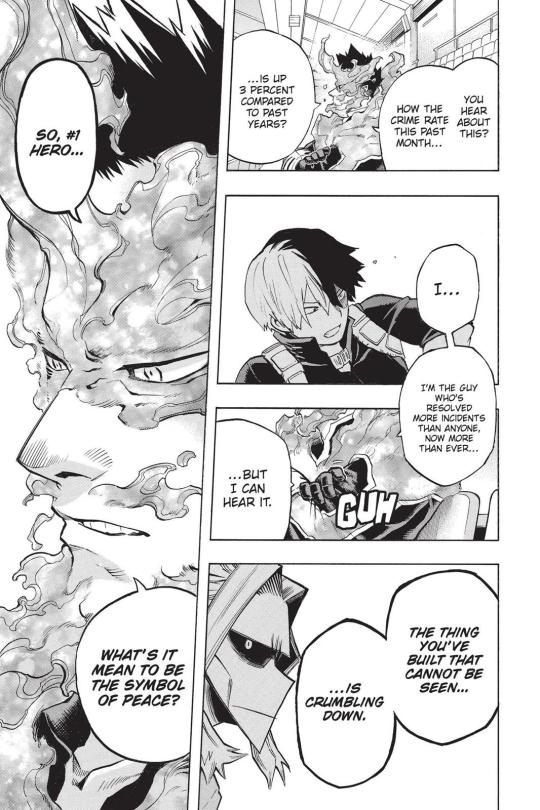
it took a lifetime of failure and the loss of everything he’d been working toward for Endeavor to finally realize he was doing something wrong, and to ask for help. but this isn’t the case with Katsuki. partly because he was able to put his ego aside in this one crucial moment, but even more than that, it was simply because Izuku had never left a gap between them. Katsuki never had to work to build a bridge. Izuku was laying planks behind him every single step of the way. never expecting that Katsuki would actually follow them, but leaving them there for him regardless. leaving this path back open for them to reconcile, should Katsuki ever choose to finally meet him halfway.
and because of that faith, because of his open and giving nature, the end result is that he now has something that All Might never had: a partner. someone to help shoulder that weight. someone else who understands that burden. and someone who is now working together with Izuku with unexpected earnestness.
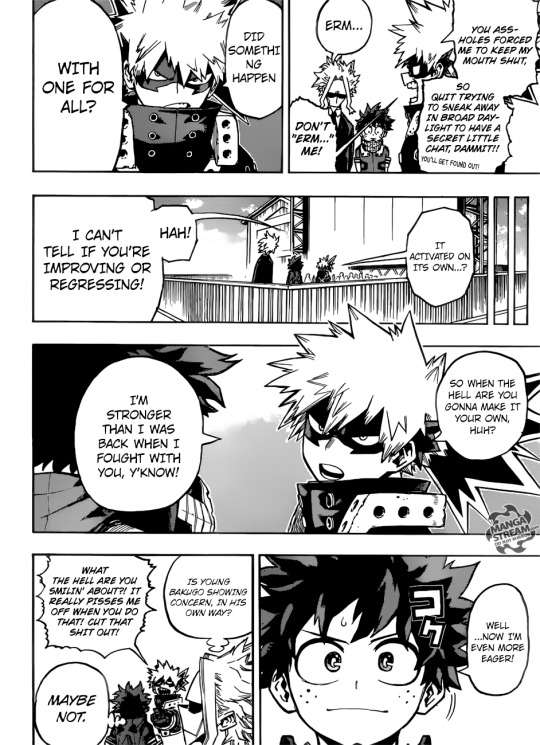
and so this is Key Difference # 3: whereas All Might and Endeavor were only ever at odds, two opposites on a polarized scale, Izuku and Katsuki are learning to work together. to learn from one another. to share what the other lacks, and to make each other stronger.
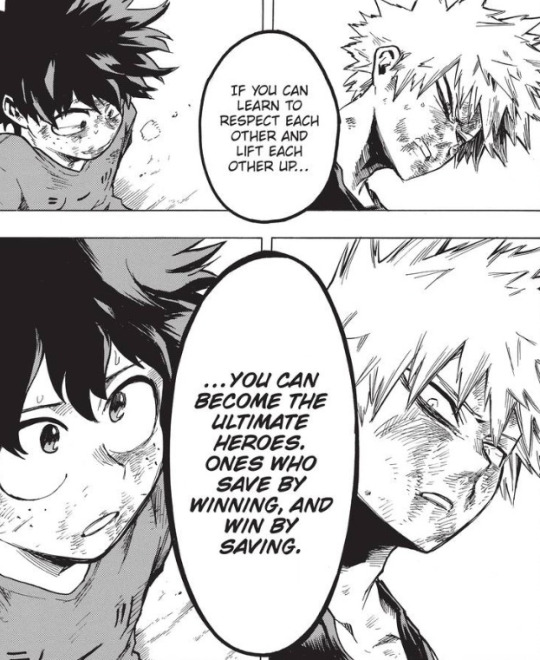
incidentally, just in case any part of this essay has come off as me being overly critical of All Might, or pinning the blame on him for the failures of the previous generation, let me assure you that I don’t fault him at all. All Might did what he thought was right, and managed to turn an impossible dream into a shining reality against all odds. the Symbol he became brought about peace for many years and inspired the next generation of heroes. he was not wrong in what he was trying to do; his only flaw was in being so determined to shield others that he ended up taking on too much by himself.
and I’ll say this for All Might too: in the end, he himself realized where he had gone wrong. there’s a reason why, particularly since his retirement, he’s started mentoring Katsuki in addition to Izuku. All Might knows better than anyone else the burden that sits on Izuku’s shoulders, and he knows just how hard it is to go that course alone. I already gave credit to the boys, but let’s go ahead and give All Might some credit as well, because he, too, is now course-correcting. he’s learning from his mistakes, and helping build a new generation that can succeed in building an even brighter future than the one he once sought.
as a certain melty-face scenery-chewing villain once said, “when people know that there will be an end, they entrust.” this series began with the passing of a legacy from one generation to the next. and now in this latest arc, we’re again seeing that theme of entrusting, of the old guard passing down the torch to the young guns. and shockingly, not just with All Might, but Endeavor as well. reluctant though he was at first, he, too, is now doing his best to help guide these kids down the right path. placing his faith in their strength.
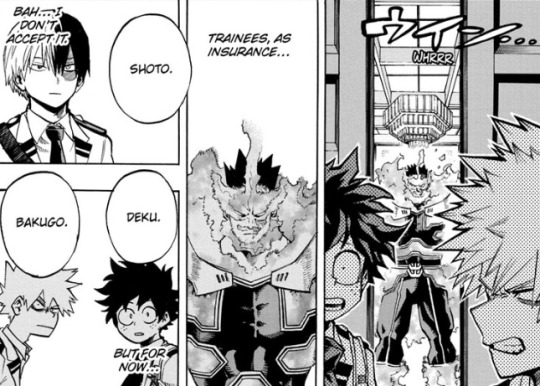
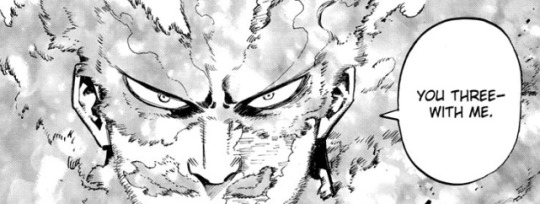
I started off this essay by saying that All Might and Endeavor are who Izuku and Katsuki could have been. but now, to conclude things, I think it’s only fitting that I turn that on its head. All Might and Endeavor are not who Katsuki and Izuku could have been. Izuku and Katsuki are who All Might and Endeavor could have been. they are the ideal vision that never came to pass. the brand reimagined. the song remastered. Izuku and Katsuki will be able to reach heights that All Might and Endeavor never achieved, because they were able to shed loneliness and pride in favor of trust and a sincere willingness to learn.
so yeah.
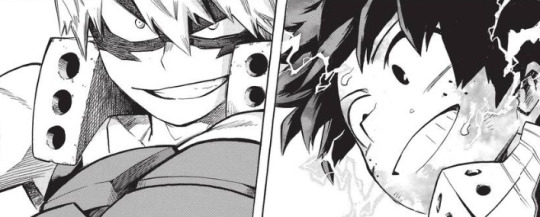
all hail the new kids.
#boku no hero academia#bnha meta#bakugou katsuki#midoriya izuku#bakudeku#endeavor#all might#bnha spoilers#mha spoilers#makeste reads bnha#bakugou meta#endeavor meta
430 notes
·
View notes
Text
here’s oli!
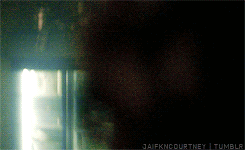
「 alex saxon. cis male. he/him. 」 — is that OLIVER ‘OLI’ ARTIS i just saw in thornhollow? word around is that they’re a THIRTY-TWO year old HUMAN, but i doubt that’s true. they’re pretty CHILL from what i know, but i’ve heard a rumor that they can be LONELY too; must be why they’re a DINER OWNER & COOK. they kinda remind me of WORN JEANS WITH A NOTEPAD TUCKED IN THE BACK POCKET, ON OLD GUITAR GATHERING DUST ON THE WALL, A WARM SMILE & A KIND HEART. ( ooc ali. she/her. 27. est. )
— basics;;
NAME : oliver artis ALIAS ( NICKNAMES ) : oli AGE : 32 SEXUAL ORIENTATION : pansexual GENDER IDENTITY : cis male ( he/him pronouns ) SPOKEN LANGUAGES : english OCCUPATION : cherry’s pies ( a local diner ) owner and cook FAMILY : eleanor artis nee hanson ( mother, estranged ), ian artis ( father, estranged ), cherry rose hanson ( grandmother, deceased ) PETS : a golden retriever named bowie who frequently hangs out at the diner POSITIVE TRAITS : chill, confident, hardworking NEGATIVE TRAITS : sarcastic, lonely, guileless
— a look deeper;; ( trigger warnings: parental abandonment, alcoholism, parental figure death )
full disclosure: i’ve played oli before so this is structured by what the old bio is so i’m gonna give a few quick points followed by the full thing!
oli was born and raised in thornhollow. his parents both lived and worked in town until oli was around twelve when his father left their family, and his mother was never the same. she was a workaholic under the best of circumstances, but after his father left, she couldn’t handle being his mother as much anymore so he was essentially raised by his grandmother ( also a thornhollow native ) after that.
left for college, but came back when he found out his grandmother needed extra help, especially at the diner that was her pride and joy. his mother had since moved out of town for “bigger and better things.”
tried not to be bitter about his parents leaving him, but it was hard. his grandmother showed him unconditional love though and he was forever grateful to her. she passed away a couple months ago, and he’s not entirely over it yet.
he did take the diner over after her passing, but the bills are beginning to pile up, and he’s not sure if the diner is going to survive.
personality-wise, he’s pretty chill and easy going. oli’s kinda a go-with-the-flow person who doesn’t have time for drama or manipulations. he’s more focused on making the diner successful and frequently is found working on something even when he’s not technically scheduled to be there.
does not know specifically about the different species around town, but does know that there are weird things that happen in thornhollow. pretty open-minded about it all. operates under a ‘don’t ask, don’t tell’ sort of policy.
i.
A boy of six sat cross legged on the ground in front of his father watching with a bright and eager smile. His father had his own eyes closed, humming softly along with the melody he strummed on his favorite guitar. Oli wanted to bounce in rhythm with the music, to cheer, or even sing along. But he knew that was not allowed, not while his father was practicing. And because he wanted more than anything to be considered a grown-up, old enough to sit in and listen, he kept himself quiet and still until his father had finished and it was time to clap. It was this time that was precious to him, the time he had his father all to himself. His father might not acknowledge his presence other to bask in the boy’s love, but this time was still infinitely valuable to the child. He knew when his mother arrived home from work and sent his nanny home for the day, she would whisk his father away on some adventure he was too young for. He didn’t mind, really. Oli knew that people just felt better after being around his father so he couldn’t blame her for wanting him all to herself for a time. But it did make this time more important than ever. And he had always been his father’s biggest fan.
It didn’t matter to Oli that his father rarely had time for him outside of this. That he only wanted someone to play an adoring audience. Even when his father screamed at him for making too much noise during his song. Even when his father threw the glass of bourbon against the wall, shattering it into a million pieces. None of that mattered to the boy. He understood then at such a young age that his father just wanted everything to be perfect. “I’m going to be famous one day, Oli,” he would say, his words slurred. And of course, Oliver believed them. After all, what father would lie to their son?
ii.
Oliver knew something was different from the moment he arrived home from school. There was something not entirely right. Some spark that normally resided in the house seemed to have gone out. He almost didn’t notice his father’s prized autographed picture of David Bowie was missing from its spot on the wall. He almost missed the pitying look his nanny ( that he was far too old to have now that he was almost out of middle school) gave him as he walked towards the stairs. He almost missed the low sobbing that seemed to be coming from above him where he knew his parents room to be. But he didn’t.
He sprinted up the stairs, though it seemed to take ages to reach the top. Instead of racing towards the crying he knew belonged to his mother, he went towards his father’s studio instead. He hesitated before pulling the knob, already knowing what he would find. Or not find. He let out a soft gasp at what he saw anyways. Empty.
“This was your fault,” a voice behind him said, thick with rage and heartbreak. He turned to see his mother, clutching one of his father’s shirts, tears streaming down her face. She already looked as if she regretted the words, but they could not be taken back now. They were already in the world, waiting for everyone to hear and know.
Oli was sent to his grandmother’s the following week.
iii.
Oliver looked too much like his father. Acted too much like him as well. A carbon copy if ever there was one. That was one of the reasons his mother didn’t like to see him. He knew that even if she insisted it wasn’t true. More and more of late, he had skipped out on holidays with his mother, finding the silence too loud and the house too empty. It had lost its spark the day his father left them. Instead, he spend the time with his grandmother baking far too many sweets for the two of them and delivering the extras to their neighbors. It had stung far more than he ever wanted to admit. He loved his grandmother, appreciated everything she’d done for him. But holidays had been difficult since his father had left, and his mother had essentially stopped seeing him on a regular basis. But now, Christmas Eve, he felt more in the holiday spirit than he had in a few years. He’d already done the obligatory phone call to his mother to wish her a happy Christmas, so he had the rest of the day to himself to binge watch Netflix and eat more sweets than any one person should be able to while his grandmother visited some of her friends who didn’t have any family left. At least, he had that free time until she came home, and it was time for their dinner. It was this night he found out why his father had left them.
He had never really liked social media. Far too much of it was just people pretending to be the ideal versions of themselves. He much preferred reality. Nevertheless, he was a member of a few sites as most teenagers his age were, though he did rarely use them. It was on one of these sites that he saw the message from his father. Already it was a week old and Oliver was torn between anger at himself for not checking sooner and wanting the satisfaction of deleting it without reading. But his curiosity won out as it normally did.
It was short, barely a few lines. It told of his success in music. It seemed he had finally found a band and it looked like they might get a record deal with a big name company. He invited Oli to a show sometime. It was full of excuses instead of explanations. His father had a dream that he just had to see realized. A dream that didn’t involve being a husband or father even though he had been both. But his father never once apologized. And Oli never responded even though the child inside wanted nothing more to have his father back in his life once more.
iv.
He was just out of college when he got the call from his grandmother. He was almost expecting to hear her tell him something had happened to his father or mother, that the alcohol had finally killed him, or the combination of a broken heart and being a workaholic had done her in, but instead she was just talking about things around the house and the diner. She didn’t mention anything was wrong, but Oli could hear it in her voice. It took a while to break her down, but she finally admitted that she hadn’t had a good visit with the doctor. She was getting older and couldn’t move around as easily as she could when she was younger. That and her bad habit of smoking had finally caught up with her. She wanted her family to be around instead of strangers in her home. Although she didn’t ask him to move home, Oli knew that was what his grandmother needed. It took him a few days to consider choice.
Oli had a job offer in the city, a good one that would set him up for life. He’d break free of the pattern of either being a deadbeat like his dad or a cold, workaholic like his mother. He had worked hard to graduate with honors from the university, getting his master’s in accounting and finance. He had looked at a few apartments and had found one he was sure would be perfect. He had a life planned out ahead of him that he was sure would be successful, one that would put his parents to shame.
Instead of following that path, he moved home and began helping out at the diner he’d spent his teenage years working at.
v.
Oliver was thirty-two when his grandmother died, leaving him everything she had ( the house, the diner, no savings, and bills that were piling up ). He’d been living with her for nearly a decade, working at the diner and taking care of his ailing grandmother as she got progressively worse. She hadn’t been entirely truthful when she’d called him; she hadn’t mentioned that her mind and body were both failing faster than she could really keep up with. But Oli did his duty as best as he could, was hailed as some sort of hero by those around him. Instead of living his life, he was at a sort of standstill. One that didn’t end even after her death. He knew he could have tried to get a job in his field, but he couldn’t really muster any sort of enthusiasm for the life he’d once planned. He felt like it was a dream long since gone. Instead, he was content operating the diner that his grandmother had loved so damn much. He liked his quiet and simple life, working and coming home to his dog, Bowie. Maybe it wasn’t the fame-filled one his dad had been searching for or it wasn’t typically successful like his mother, but it was something that was his.
— connections;;
would love some employees at the diner
maybe some friends who he can chill with
exs? currents? idk
5 notes
·
View notes
Text
Through A Glass Darkly

Through A Glass Darkly (Såsom i en spegel) 1961- Ingrid Bergman
For now, we see through a glass, darkly; but then face to face: now I know in part; but then shall I know even as also I am known. - Apostle Paul
It wouldn’t be a Bergman film without a powerful challenge to religion, and it is no different from Bergman’s 1961 film Through A Glass Darkly. The title in English comes from the Bible itself while the Swedish translation is In A Mirror which echoes the film’s resounding themes as well, but in this case, I prefer the English translation.
The story takes place on a family island in Sweden. Karin (Harriet Andersson) returns home after a stay in a mental hospital where she hopes to recover from her Schizophrenia. On the island she is joined by her younger sexually frustrated brother, Minus who is played by Lars Passgård, her husband the ever talented Max von Sydow (one of my top 10 favorite male actors) who plays Martin, a loyal but cautious doctor whose perceptions of reality fall the closest to earth, and Karin’s estranged father David (Gunnar Björnstrand) who returns home after completing a novel and a near death experience.
I am very opposed to romanticizing mental illness and dismissing it as a connection to spirituality or on the other hand, witchcraft. Women have often been portrayed as conduits for something other than our reality and this can either be angelic or demonic depending almost entirely on our perspective or the perspective of the narrative. However, I wanted to suspend my opinions in order to engage with what Bergman is trying to tell me.
One could argue that the main storyline is Karin’s since she has the most on-screen time but I actually find the main drama to be focused on the father figure, Martin. We are told in the film that he has abandoned his children after the death of his wife who also shares the same schizophrenic condition as Karin. After the wife’s death, Martin quickly became successful with his novel which may or may not have been written from his experience with his wife. When he returns home he makes it clear that he will be leaving after a month despite a forgotten promise to his children who are dismayed.
If schizophrenia is genetic then the family talent for storytelling is as well. When Martin enters the house at dinner to have a very well acted cathartic cry which I immediately could resonate with as reality. Minus has created a play in order to show his father his own standing as a creative individual. The play within a play has been done by Bergman before and is most well known for its symbolic representation in Hamlet. David is clearly aware of this and takes the short play as a personal affront.
Minus tells the story of an artist who feels that his own life is his work of art and creating representations of his life cheapens the meaning. The Artist is taken by the feminine beauty of a princess who died early in childbirth and is forced to witness her husband she left behind slowly forget her and move on to other pleasures. She acknowledges the artist who can penetrate a mystic veil in order to talk to her despite her being dead and unseen to those who are not sensitive enough. The ghost invites him to join her in death and share eternity with her, the Artist agrees to do as she wishes and thus solidifying his life as a work of art. At the time of importance the Artist second guesses himself. A series of questions he asks seem realistic to those who consider suicide as an option. What awaits me apart from the cold embrace of eternity? What is there to do but exist, surely it is better to have something to do than nothing, and what if there is nothing? The princess waits and then closes the door, oblivion and whatever promises it has is closed to him forever. The Artist feels no remorse and instead decides to make a tribute to the princess but decides to give himself a more heroic ending, thus displaying himself as the ultimate hypocrite.
Minus knows this either instinctively or consciously and it perfectly sums up the internal dilemma of David. He laments that he has sacrificed his family for his own success and admits to Martin that he did want to document the descent into madness of Karin for his own profit. He asks Martin if he ever wishes that Karin was dead and explains that Martin’s suffering is pointless. Martin is repulsed by David’s honesty and directness and argues that his principles as a husband and father are missing. If Martin regrets marrying Karin he does not admit it to anyone other than himself but admits that he knows that his job as Karin’s only anchor to the world and the seriousness of how his actions will affect his wife. A crushing weight to bear, and we are curious to hear how he will respond to David’s question. We do not feel that he is being as emotionally open as he could be, but his company is perhaps not the place to be so open. We see that things are not easy for David, along with his wife’s sudden and dramatic shifts in the mood she has also lost her sexual drive and David is severely frustrated. We see the love that is there for Karin in these moments and the rejection from Karin is painful to the audience to see.
Martin has recently experienced a near-death event on his way to commit suicide. He said he felt empty with no expectations on his way to meet his own end but a chance meeting with death through a car accident left him with a new found love for his family. I like this story and I like that it comes after Minus’ play. It hints that Martin has already met with the woman in the castle and decided to live because what his experience imparted was not a chance to profit but instead a chance to love those who love him. I like that it wraps up that story and validates Martin who later laments in a real connecting moment with Karin that he is forced to live in reality, but it is the most alive and human we have seen him through the whole film.
Karin’s story is separate from her fathers. With Karen and her illness, she is drawn between two realities. Karin knows she cannot live in both and feels compelled to choose between the two. From the beginning, we see that she is leaning toward the unknown because of its perceived connection to God. I wondered originally how Bergman would portray her madness and was relieved to see that he makes it painfully clear that Karin is mad and not to romanticize the illness as a storytelling device which was my biggest problem with Dryer’s Ordet.
However, I want to believe that Bergman is capable of telling a bigger story here without sacrificing the illness and its negative effects on the members of the family. I am a supporter of the divine in every day and like Agent Mulder, I always want to believe that there is something greater than us at play, but for most of the movie I had a hard time convincing myself that there was a legitimate spiritual connection. Karin’s character is playful but gentle and has no vices except for her illness which begins showing a more menacing turn when voices which lead to the eventual seduction of her younger brother.
After she submits to her illness and decides to return to the hospital but the illness is not done with her yet. She hears voices telling her that the moment she has been waiting for is almost at hand. God is approaching and she must be ready to join him through the wallpaper. I wondered how much influence Bergman had taken from The Yellow Wallpaper by Charlotte Perkins Gilman because Through a Glass Darkly has visual similarities that I thought would be great to be captured while I was reading Gilman’s short story. A shot of light dancing on the repeated motif wallpaper was a powerful artistic portrayal of Karin’s own mind.
At the pinnacle of Karin’s story, we have two separate things happening. In the attic, we hear an overpowering noise of the ambulance helicopter approaching. The wind knocks the windows and the blinds open and a small hidden door that is covered in wallpaper to make it undetectable. The camera stays on Karin’s face and we watch her make her decision to which reality she wants to live in. She approaches the door but then is frozen in horror. After catching herself she begins to scream in terror and becomes like a wild animal. It takes both her father and her husband to restrain her until she is given a sedative. Harriet Andersson displays powerful acting during this scene where she had to drop her social inhibitions.
When she is calm she tells us why she did what she did. She says that when the door opened she looked for God to come through but instead of what she imagined to be God, a black spider emerged toward her. The spider came towards her and tried to enter inside of her. She recoiled in terror and the spider god turned away from her and left. I was a little disappointed that Bergman chose to use the Spider to represent something awful and horrifying since in many other cultures, including the Native Americans, have a much healthier approach to the mythos of the Spider from one of fear to another of building dreams and wisdom, but that’s just me.
In either case, it seems to prove the point of the title. We see through a glass darkly every day of our lives. What we see of each other is distorted by our own lives, ideas, thoughts, and beliefs. We can only see part of the vision, and we elaborate on our own to what that might mean. David distorted his love of his family for love of writing about his family, a slightly different reality than the one around him. Karin’s test was if she could love the divine if it did not conform to her own understanding of what God was, and she could not. I think this answered for me the problem that I was having earlier with her divinity versus madness. In a way, Karin’s inability to transcend herself was the reason why her character was caught in her own madness and why other feminine characters with the same controversial situation have had different outcomes. I was grateful again for Bergman’s “reality” of the character’s dilemma and making Karin have an ending that was understandable even if it was not the happy ending that he was toying with.
2 notes
·
View notes
Text
Offspring's Kat Stewart: How child's play led to a fabulous career
By Michael Lallo June 21 2017
Kat Stewart is one of our most versatile actors. Her early years explain why.
As a young girl, Kat Stewart would return from school and mimic her British classmates. Sometimes she was a Cockney lass, dropping her H's like Eliza Doolittle. Then she'd switch to an upper class accent, with its bias against vowels. (Notice how a posh Englishwoman blows her nose on a "hndkrchff".)
Stewart spent her first seven years in Bairnsdale, 300 kilometres east of Melbourne. Then her parents took the family on an adventure. Basing themselves in Britain, they explored Europe in a campervan. For a few months, she attended school in London. "Coming from a small country town, it opened my eyes up," says Stewart, who plays Billie Proudman in Ten's hit drama Offspring.
One year later, the family came home. But Stewart's fascination with language persisted. It all seemed like a bit of fun: observing the way others spoke, then imitating them in private. In fact, she was unwittingly training to be an actor. Since her days in the ensemble of Red Stitch, an independent St Kilda theatre, critics have praised her faultless accents. American newsreader, aristocratic Londoner, Aussie battler – she's perfected them all.
In 2008, her star rose with her portrayal of Roberta Williams in Nine's Underbelly. But Offspring made Stewart famous.
On a cold Tuesday in Melbourne, she rehearses her final scenes of the new season. We're in the Union Club Hotel, a 160-year-old pub with a main bar untouched since the early 1970s. To Offspring fans, it's simply "The Union", the location of several pivotal events. Kim (Alicia Gardiner) gave birth on the pool table. In the dining room, Billie married Mick (Eddie Perfect). Today, Nina (Asher Keddie) enjoys a sweet moment with daughter Zoe (Isabella Monaghan).
Stewart stands to side, clutching a flute of soda water with a splash of Coke. (It looks just like champagne on screen.) After a freighted conversation with another character, Billie has a moment of clarity. Her eyes mist over, but no tears are shed.
Describing this in detail would ruin the finale. It's safer to discuss the first episode, with Billie in Melbourne and Mick in London.
"It's tricky, because he's the love of Billie's life," Stewart says. "She's walked over broken glass to be with him. They're leading separate lives. That's a big thing for Billie to deal with."
The week prior, Stewart and I have lunch with two castmates: Keddie and Alexander England, who plays Nina's boyfriend Harry. I fish out Stewart's first Green Guide cover, published nine years ago. "You're just a baby in that photo!" Keddie says.
Afterwards, Stewart reflects on that time, when she co-starred with Shaun Micallef in the SBS satire, Newstopia.
Then Underbelly became a cultural phenomenon. In Victoria, the show was slapped with a suppression order, so as not to prejudice a related murder trial. "It was different for the actors living in Sydney," she recalls. "Up there, they felt the full force of [its success]. It took a while to happen here. In retrospect, it was a real turning point. But it didn't feel that way at the time."
Not least because Stewart isn't one to be swept up in hype. Compared to most of her characters, she is soft-spoken and low-key.
In 2013 she declined to reprise her role as Williams in Fat Tony & Co, which focused on the hunt for Tony Mokbel. Instead, Hollie Andrew took the part. "There wasn't much footage of Roberta at the time; maybe a couple of interviews. Six years later, we knew so much more – how she walked and talked; more of her story.
"I did an interpretation. To play her again, I'd need to include that new information. I felt it should be someone new."
Besides, Stewart had plenty on her plate. In addition to Offspring, she had starred in the Foxtel drama Tangle, then Ten's crime-comedy Mr & Mrs Murder. Guest appearances include Peter Helliar's film It's a Date, and an upcoming episode of True Story with Hamish and Andy. Somehow, she still finds the time for live theatre.
In grade two, her teacher ran a drama session for her class. A spark went off inside the seven-year-old. "It felt right in my bones. I was very shy, but not when I was acting. I never thought it was a career option, though."
Stewart studied arts and marketing at Monash University, then got a sensible job as a publicist for Penguin Books. (Perhaps it's no surprise her publicists say she's a pleasure to work with.) Yet her desire to act remained, and she enrolled in a night course at The National Theatre.
"I was hoping I'd grow out of it," she laughs. "I knew it wasn't a great bet in terms of financial security."
Her hunch proved correct – at least early on. After some decent gigs, she endured "tumbleweeds" for 18 months. "There weren't as many guest roles in those days. You'd do Blue Heelers and Stingers and Neighbours. That was it."
Joining Red Stitch changed everything. As an ensemble actor, she stretched herself in a variety of meaty productions. "I probably care more about what [the other performers] think than anyone else," she says, "because they know my work so well."
Early on she played an abused woman who haemorrhages to death. "That's when I learned that classic thing of not judging your character."
This served her well in Offspring. The series rarely offers up its characters as role models. Nor does it slot them into a "good" or "bad" column. Instead, it makes them interesting. Consider Billie, always throwing herself into a new self-improvement project. Often she makes a hash of things. "And I love that!" Stewart says. "But I also love that she just keeps pressing on. She's got a heart and she'll do anything for the people she loves."
In season two, Billie tried IVF and suffered a miscarriage. Stewart was 38 at the time, married to actor David Whiteley since 2008. "We'd always said, 'One day, we'll have kids'. But that storyline made me think, 'We can't just assume it will happen'." By the end of that season she was pregnant with their son, Archie. Last year she gave birth to Georgia. Not bad for a relationship that wasn't meant to happen.
Stewart had a "no actors" dating policy when the pair met in 2002; both part of Red Stitch's ensemble. It wasn't long before their characters became romantic. "Our first kiss was a pretend one, on stage," she says. "Then I was just a bit strange around him for a couple of years. We didn't get together until 2004."
Last year, Billie began looking after Brody (Shannon Berry), the teen daughter of an estranged friend. Now, Brody has a newborn son. "I love that Billie can explore having children and babies in her life, without actually having her own baby. You don't see that very often.
"Our characters screw up, they hurt each other ... but no one is reactionary or bigoted. Offspring is a really generous show. It celebrates family – not just in the traditional sense, but the family we choose."
WHAT: Offspring WHEN: Ten, Wednesday 8.30pm
Twitter: @Michael_Lallo
SOURCE: http://www.smh.com.au/entertainment/tv-and-radio/offsprings-kat-stewart-how-childs-play-led-to-a-fabulous-career-20170616-gwskov.html
1 note
·
View note
Text
The 4-Star Reviews of 2018
As the year comes to a close, and you’re wondering what to see before you make your top ten list or pick up the latest Twitter fight about awards season, we are here to guide the way. First, check out Chaz Ebert’s guide to her personal picks for films to see before the end of the year, and then peruse the 32 films from the year that our staff critic gave the highest possible rating—4 stars.
“24 Frames”
“Kiarostami was, finally, more than a great filmmaker; he was an artistic titan whose work transcends both cinema and the culture of Iran. How fitting that this lovely final film is one that could be enjoyed by fourth-graders as easily as the most knowledgeable of Kiarostami’s admirers.” (Godfrey Cheshire)
“Amazing Grace”
“Whether you’re religious or not, you owe it to yourself to see this movie if the chance arises. You’ll see how much love and feeling went into the construction of the resulting album. Additionally, “Amazing Grace” is profoundly moving and extraordinarily soothing. Nowadays we could use a good salve. To paraphrase another gospel standard, if we ever needed this film before, we sure do need it now.” (Odie Henderson)
“The Ballad of Buster Scruggs”
“What’s most bewitching throughout “Scruggs” is its sense of detail. Its meshing of formal discipline and screwed-down content sometimes give it the sense of a work that has been carefully and elaborately embroidered rather than photographed.” (Glenn Kenny)
“Black Panther”
“For all its action sequences (they’re refreshingly uncluttered, focusing on smaller battles than usual) and talk of metals that exist only in the mind of Stan Lee, “Black Panther” is still Marvel’s most mature offering to date. It’s also its most political, a film completely unafraid to alienate certain factions of the Marvel base.” (Odie Henderson)
“BlacKkKlansman”
“This is not only one of the year’s best films but one of Lee’s best as well. Juggling the somber and the hilarious, the sacred and the profane, the tragedy and the triumph, the director is firing on all cylinders here. "BlacKkKlansman" is a true conversation starter, and probably a conversation ender as well.” (Odie Henderson)
“Blindspotting”
“This movie swings between high drama and low comedy, and between terrifying danger and sweet moments of near-romance. Then it climaxes with an intense, brilliant monologue that is an almost otherworldly dare, a piece of performance art that some viewers are bound to question. Like all great movies, “Blindspotting” is a force to be reckoned with and wrestled with. No matter where you land in your assessment, your expectations are guaranteed to be shattered.” (Odie Henderson)
“A Bread Factory, Part One: For the Sake of Gold”
“A Bread Factory, Part Two: Walk with Me a While”
“This is my favorite film of the year by far—and when I say "film," singular, I'm referring to both halves of "A Bread Factory," because they flow together in the mind. As of this writing, I've seen both parts three times. With each viewing, I notice new things and am more moved by the characters, who are unique and eccentric in the way that real people are, but written and acted with the economy and directness that distinguishes characters in well-constructed plays or short stories—ones where the storytellers know what they want to say and how best to say it.” (Matt Zoller Seitz)
“Burning”
“The three main characters circle warily, looking at each other with desire, mistrust, need, never certain of the accuracy of their perceptions. Lee's explorations require depth and space. It's a great film, engrossing, suspenseful, and strange.” (Sheila O’Malley)
“Elvis Presley: The Searcher”
“The image of Elvis shifts, depending on the entry point. What is so refreshing—damn near redeeming—about HBO's two-part documentary "Elvis Presley: The Searcher," premiering on HBO on April 14, is that the entry point is Presley's art.” (Sheila O’Malley)
“First Reformed”
“Paul Schrader’s “First Reformed,” in which Ethan Hawke brilliantly plays an alcoholic Protestant minister undergoing a profound spiritual and psychological crisis, is a stunning, enrapturing film, a crowning work by one of the American cinema’s most essential artists.” (Godfrey Cheshire)
“Happy as Lazzaro”
"While it renders a touch heavy-handed in the film’s final act when Lazzaro hastily tries to put his fairest foot forward amid a world ruled by merciless capitalism, Rohrwacher still manages to pack an undeniably poignant punch with the simplest of questions: in a world defined by helplessness and social injustice, how far would one get by instincts of basic decency alone? Easily among this year’s finest films and laced with an unapologetic social message, “Happy As Lazzaro” dares one to imagine a reality where each individual would task themselves to be as selfless and morally whole as its main protagonist. If only." (Tomris Laffly)
“Hereditary”
“Aster and the cast make you care about these disturbed people and fear what they might do to one another, themselves and strangers. When something awful invariably does happen, you feel sadness as well as shock, because now it's going to be even harder for the Grahams to climb out of the pit of sadness that the grandmother's death cast them into, and finally address past traumas that they've been ignoring or covering up.” (Matt Zoller Seitz)
“The Insult”
“Altogether, the accomplishments of “The Insult” place Doueiri in the company of such masters of politicized suspense as Costa-Gavras and Asghar Farhadi. A great director already, he is surely one to watch in the future.” (Godfrey Cheshire)
“King in the Wilderness”
“In Kunhardt’s film, the embrace of quiet, ordinary moments not only aids in the illumination of King himself, but also in the America in which he preached. The camera lingers on the normalcy of city streets, suburban neighborhoods, and churches, juxtaposing these peaceful places with chaotic footage from the '60s: loud, chaotic, taken with shaky cameras, or immortalized in static photographs.” (Arielle Bernstein)
“Leave No Trace”
“Everyone needs to choose their own way. In "Leave No Trace," Granik creates a specific mood, gloomy and yet redemptive, sometimes simultaneously. The redemption is painful, though, because it comes with such a hefty price.” (Sheila O’Malley)
“Let the Sunshine In”
“To add a twist to this demonstration, Denis breaks it off late in the movie, and jumps briefly into someone else’s storyline, someone who had been a stranger up to this point. Then the filmmaker wraps it up in a final shot that’s both cerebral, whimsical and wry in its wisdom. The film’s confidence comes in part from the acceptance of the things that can’t be known.” (Glenn Kenny)
“Life and Nothing More”
“Without ever spelling it out, Esparza shows us how our treatment of one another as members of the same human family is a direct rebuke to the divisions enforced by tyrants to keep us frightened and isolated. In its poetic simplicity, the film’s deeply moving final shot suggests that our estrangement can be mended the moment we choose to lock eyes and listen to each other, allowing our voices to rise above the deafening cries of our presumptions.” (Matt Fagerholm)
“Makala”
“The power in this story from comes from its very distilled manner: it tells a timeless story about hard work by completely immersing us in the steps of process, focusing on an act of incredible physical commitment.” (Nick Allen)
“Memoir of War”
“Among its many notable achievements, “Memoir of War” is one of the best films I’ve seen about the ways in which grief can pull a person in both directions simultaneously. Whereas the film’s first half plays more like a thriller, the second half proves to be an emotionally wrenching interlude perched on pins and needles.” (Matt Fagerholm)
“Minding the Gap”
“This movie doesn't just give you the general outlines of its main characters' lives and send you out wiping away tears; it paints a vivid picture of lower-middle class life in a depressed American city (Rockford, Illinois) that movies rarely show us.” (Matt Zoller Seitz)
“Mission: Impossible – Fallout”
“It’s got that finely-tuned, perfect blend of every technical element that it takes to make a great action film, all in service of a fantastic script and anchored by great action performances to not just work within the genre but to transcend it. This is one of the best movies of the year.” (Brian Tallerico)
“Monrovia, Indiana”
“Wiseman, who customarily mans one camera, oversees the audio mix and edits his films, is 88 years old now; despite its lack of overt subjectivity, the movie seems preoccupied with mortality in a way that has little to do with its ostensible subject. I hope Wiseman is well and happily at work on his next film. But there’s an implication of a testament here that makes “Monrovia, Indiana” unalike in a poignant way.” (Glenn Kenny)
“The Other Side of the Wind”
““The Other Side of the Wind” is a very rich film and a very difficult one. I’ve seen it nearly three times now and what I intuit about the aspects of it that “work,” and those where the seams just show too nakedly shift all the time.” (Glenn Kenny)
“Private Life”
“This film is a reminder that the smallness of life can feel huge when we're in the middle of it. A perfect final shot sums up everything "Private Life" has been telling us and showing us, while letting us imagine Rachel and Richard's destiny for ourselves.” (Matt Zoller Seitz)
“The Rider”
“Chloé Zhao’s “The Rider,” is the kind of rare work that seems to attain greatness through an almost alchemical fusion of nominal opposites. An account of rodeo riders on a South Dakota reservation, it is so fact-based that it almost qualifies as a documentary. Yet the film’s style, its sense of light and landscape and mood, simultaneously give it the mesmerizing force of the most confident cinematic poetry.” (Godfrey Cheshire)
“Roma”
“Cuaron has made his most personal film to date, and the blend of the humane and the artistic within nearly every scene is breathtaking. It’s a masterful achievement in filmmaking as an empathy machine, a way for us to spend time in a place, in an era, and with characters we never would otherwise.” (Brian Tallerico)
“Shirkers”
“Cardona may have taken something from them they will never fully get back, but Tan’s documentary returns the narrative back to her and her friends. He no longer has the last word on “Shirkers,” they do. And isn’t reclaiming our stories what this cultural moment is all about?” (Monica Castillo)
“Shoah: Four Sisters”
“This is minimalist directing of a high order, practically invisible in its choices and effects, but repeated so often that it seems unquestionably indicative of a very particular style—one that aims to create the conditions necessary to birth a compelling though understated remembrance of unimaginable pain. The story is shaped in the process of recording it, rather than being excessively manipulated after the fact.” (Matt Zoller Seitz)
“Shoplifters”
““Shoplifters” feels like a natural extension of themes that Kore-eda has been exploring his entire career regarding family, inequity, and the unseen residents of a crowded city like Tokyo. With this movie especially, his characters and their predicament are not merely mouthpieces for the issues that interest him but fully-realized people who feel like they existed before the film started and will go on after it ends.” (Brian Tallerico)
“Widows”
“The emotional currents that power Steve McQueen’s brilliant genre exercise are different—it’s societal inequity, exhaustion at corruption, and outright anger at a bullshit system that steals from the poor to give to the rich. McQueen’s masterful film is the kind that works on multiple levels simultaneously—as pure pulp entertainment but also as a commentary on how often it feels like we have to take what we are owed or risk never getting it at all.” (Brian Tallerico)
“You Were Never Really Here”
“"You Were Never Really Here" is a taut and almost unbearably intense 90-minutes, without an ounce of fat on it. Ramsay doesn't give you a second to breathe. It's grim, it’s dark, it’s delirious fun.” (Sheila O’Malley)
“Zama”
“”Zama” is a mordantly funny and relentlessly modernist critique of colonialism that makes no conclusions, ultimately resting on a scene of verdant nature not entirely stained by humanity.” (Glenn Kenny)
from All Content https://ift.tt/2PbnNKS
0 notes